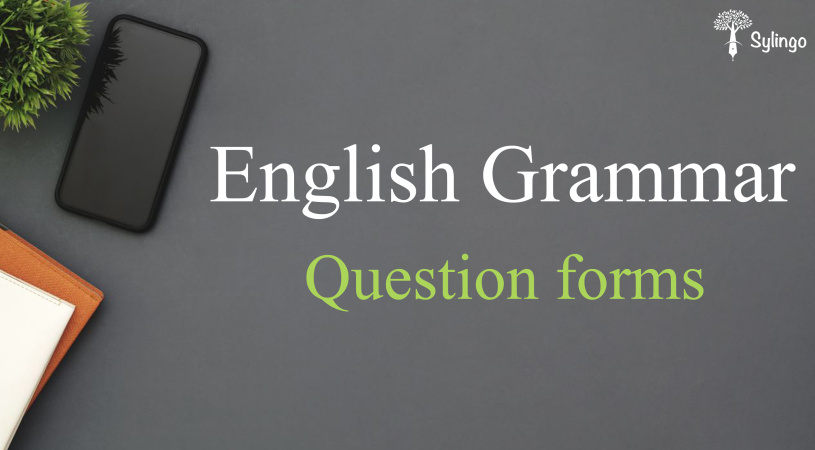We use interrogative sentences in English to ask about something, a person, or a place. We will learn about two types of questions in this lesson.
Questions types
1- Wh questions
2- Yes/No questions
Wh questions
It is a common type in English. We use question words that often start with (wh) to ask about people, places, or time.
|
Interrogative words |
Reference |
|
Who |
For people and subject |
|
Where |
For places and positions |
|
Why |
For reasons |
|
When |
For time |
|
What |
For things and information |
|
Which |
For choices |
|
Whose |
For possession and ownership |
|
Whom |
For object |
|
What kind |
For descriptions and types |
|
What time |
For hours |
|
How |
For manners and conditions |
|
How many |
For quantity (countable nouns) |
|
How much |
For amount (uncountable nouns) |
|
How often |
For frequent |
|
How far |
For distance |
|
How old |
For age |
|
How long |
For length (time or space) |
Forming questions
It differs from one sentence to another depending on what we want to ask about and the tense.
1- If a sentence does not have an auxiliary verb, we add an auxiliary (do - does - did) before the subject and after the question word.
Verbs after (do - does - did) come in the infinitive form.
Examples:
He goes to the park. → Where does he go?
Here the question is about the place, so we use Where.
I work at the mall. → Where do you work?
Here the question is about the place, so we use Where.
Note: When the subject is (I) or (we) in a sentence, then we use (you) in the question instead of the previous pronouns.
They studied Economy. → What did they study?
Here the question is about the study, so we use What.
2- If a sentence has an auxiliary verb such as (be, have) or modals verbs (can - will - may), we switch between the auxiliary and the subject in the sentence and add the question word at the beginning.
Examples:
We are playing now. → When are you playing?
Here the question is about time, so we use When.
It has been raining in the morning. → When has it been raining?
Here the question is about time, so we use When.
Note:
We can use (who) when asking about the subject in a sentence or the object.
1- When asking about the subject: we put (who) instead of the subject without any change in the rest of the sentence.
We do not use auxiliary verbs in this case, and the main verb here always comes in singular form, whether the subject is singular or plural.
Examples:
Sally ate the apple. → Who ate the apple?
My sisters eat dinner at 6 O’clock. → Who eats dinner at 6 O’clock?
2- When asking about the object: we add the auxiliary verb (do - does - did) after the question word, noting that the verb after it is in the infinitive.
Example:
Jack loves his family. → Who does Jack love?
Yes/No questions
They are questions whose answer is Yes or No, and there are three cases.
1- If the main verb in a sentence is (be) in one of its forms, we switch between the verb (be) and the subject of the sentence.
Example:
She is beautiful. → Is she beautiful?
2- If a sentence has an auxiliary (be, have) or modal verb and then the main verb, we switch between the auxiliary and the subject.
Example:
He is traveling to Italy. → Is he traveling to Italy?
3- If a sentence does not contain an auxiliary verb, or the main verb in the sentence is not (be), we add the auxiliary verb (do - does - did) before the subject.
Example:
They travel every summer. → Do they travel every summer?
The answers form will be as follows:
Are you from Europe?
Yes, I am. / Yes, I am from Europe.
No, I am not. / No, I am not from Europe.
Remember always to put a question mark at the end of every question and start with a capital letter.
That is all about the two types of question forms. If you have any questions or suggestions, you can share them in the comments section below.
Exercises
A- Form Wh questions from the following sentences.
1- I live in this area. → ….
2- We go to work by car. → ….
3- The store opens at 9 a.m. → ….
4- He failed because he didn’t study. → ….
5- She writes poems. → ….
B- Form Yes/No questions from the following sentences.
1- I am ten years old. → ….
2- She was playing. → ….
3- You will pass the exam. → ….
4- They have lived here. → ….
Answers
A-
1- Where do you live?
2- How do you go to work?
3- When does the store open?
4- Why did he fail?
5- What does she write?
B-
1- Are you ten years old?
2- Was she playing?
3- Will you pass the exam?
4- Have they lived here?





